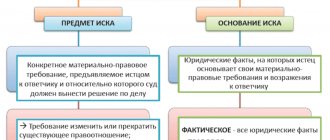Many military personnel who have lived in a service apartment for more than a year find it difficult to say goodbye to it, as they get used to the area, as well as the layout, infrastructure and other important things. Or there is simply no other living space.
In this case, they decide to keep the apartment after completing their military service, transferring it, first of all, into municipal ownership, and then registering it as their own. To understand the situation, we need to consider the question of how a service apartment can be arranged for a serviceman of the Russian Federation and what is needed for this?
Important! If you are dealing with your own case related to a service apartment, then you should remember that:
|
Can they be evicted from specialized housing?
The Housing Code of the Russian Federation (LC RF) provides for the possibility of eviction in cases of termination or termination of rental contracts for specialized residential premises. This is only possible in court, and if the former residents refuse to leave their apartments voluntarily.
The provision of alternative housing during such evictions is not provided . Only a certain category of persons has this right:
- family members of military personnel, the FSB and other government agencies;
- pensioners;
- disabled people of groups I and II, etc.
A special eviction procedure is also provided for orphans or children without parental care.
✅ Cost
Forced eviction from an apartment involves legal costs. The current state fee for filing a claim is 300 rubles (Article 333.19 of the Tax Code of the Russian Federation). A negative claim is also subject to a state duty in the amount specified.
Additionally, the plaintiff bears the costs of legal and notary services. But at the same time, he can recover compensation for legal costs from the losing party (clause 1 of Article 100 of the Code of Civil Procedure of the Russian Federation). This must also be indicated in the claims.
On what grounds?
The grounds for eviction are provided for by law. This is either the end of the term, or a violation of the terms of the contract, or early termination of the agreement to rent a service apartment.
Main reasons for eviction:
- transfer of premises to non-residential stock;
- accident rate of the building in which the apartment is located;
- seizure of land by the state for its own needs;
- threat to the life and health of children (if the tenant has been deprived of parental rights);
- leaving for another place of residence without notifying the owner;
- change of owner of the enterprise where the tenant works;
- failure to pay utility bills for six months.
The reason for the owner's claims may also be regular violations of the rights of neighbors by residents , for example:
- noise in the evening;
- fires;
- unsanitary behavior;
- exploitation of housing for purposes other than its intended purpose (for example, for drug trafficking, underground casinos, etc.).
Naturally, those who moved into the apartment without permission will also be evicted.
The reason for breaking the lease agreement is also illegal redevelopment , which worsened the living conditions of the neighbors. You can also leave a company apartment if a fixed-term contract has come to an end, or the employee quit of his own free will, staff reduction, or due to a disciplinary offense.
The standard rental agreement for a service apartment was approved by Government Decree No. 42. In the document, in particular, one can see the grounds for early termination of the agreement.
Collection of documents on the case
The very fact of the occurrence of circumstances for the eviction of citizens is not enough to carry out the procedure. The plaintiff needs to prepare for the process and prepare a package of documents.
The following documents can serve as evidence of the grounds:
- a rental agreement with a clause specifying the conditions for eviction;
- fixed-term employment contract;
- order to dismiss an employee;
- protocols on violation of public order by a tenant;
- certificate of arrears in payment of housing and communal services;
- certificate of registration or residence of a citizen in another premises.
Who cannot be evicted from a service apartment?
There is a whole category of citizens who cannot be evicted from official housing without the provision of another apartment (Article 103 of the Housing Code of the Russian Federation). The ban applies only if the family has no other housing with the right of use or ownership.
This special category includes:
- disabled military personnel;
- WWII veterans;
- combat veterans;
- elderly pensioners;
- orphans, including those whose parents died in service;
- families of military personnel killed or missing in the line of duty, representatives of the FSB, law enforcement, customs authorities, firefighters;
- employees who have worked for more than ten years.
All persons living in specialized housing must be registered as in need of improved housing conditions . They cannot evict tenants who moved in before the Housing Code of the Russian Federation came into force (2005), or those living under a social tenancy agreement or who have the right to be registered as such (Article 52 of the Housing Code of the Russian Federation). If an employee has worked for 10 years, and the apartment is on the balance of the local government, it is also impossible to evict his family after dismissal.
Resolution of the Supreme Court of the Russian Federation No. 14 notes that when evicting, all courts must take into account the interests of vulnerable sections of society, which include children, pensioners, disabled people, low-income citizens, including large families.
✅ Who is it intended for?
The use of specialized housing stock is not available to all citizens of our country. In order to transfer an apartment for use, you must obtain permission from the authorities . Privileges are addressed only to employees and their close relatives.
Who has the right to live in official housing:
- Those working under an employment contract with state or municipal institutions (rural teachers, engineers, doctors).
- Citizens working in unitary enterprises owned by the state.
- Military personnel, employees of the Ministry of Internal Affairs, Ministry of Emergency Situations, GUVM, FSB and other law enforcement agencies.
- Persons holding public or elected positions (deputies).
If an employee has separate housing in the region where he is serving, he will be denied an apartment from a specialized fund. Employees registered with social security will receive housing among the first wave of those in need.
Do they provide an alternative, in what cases and how to achieve it?
They can be evicted from a service apartment with or without the provision of housing . The alternative is offered only to the above-described preferential category of citizens (disabled people, veterans, etc.).
The issue of providing housing is resolved automatically (there is no need to go to court, etc.), but if the employer refuses to provide housing, the tenant has the right to appeal his actions. In particular, the owner of a service apartment does not have the right to put a family with a child under 18 years old on the street if she has no other housing. It is also prohibited to evict orphans. If a single person with minor children lives in an apartment, the employer also does not have the right to evict him if he has nowhere to move.
Provision is made for the provision of alternative living space in the event of a change in the owner of the official property , subject to the termination of the lease agreement for the occupied housing. Recognition of a low-income family, i.e. its registration with the Social Security Administration also gives the right to receive public housing. To speed up the issue of obtaining alternative housing, you can immediately contact your employer after receiving the notice and inform about your rights.
If there are grounds for eviction, but the employer forgot to notify the tenant about this, and three years have already passed, the court may refuse to satisfy the claim due to the expiration of the statute of limitations.
Causes
In addition to the above reasons, there are many other reasons for eviction of tenants:
- failure to comply with the terms of the contract;
- violation of the rules for using/residing in an apartment/house in accordance with Article 103 of the Housing Code of the Russian Federation, Article 83 of the Housing Code of the Russian Federation.
The provisions of the tenancy agreement are fundamental for residents, so it is necessary to carefully study the document itself so that there are no misunderstandings or disagreements.
As a rule, the agreement is concluded for a certain period, but if it is not specified, the owner can terminate it at any time, usually by notifying 3 months in advance .
Often, a family living in a property buys a new one after some time and voluntarily terminates the agreement, but there are many cases when the initiative quite naturally comes from the owner himself.
As a rule, the main reasons for such a decision are listed in Art. 83 Housing Code of the Russian Federation:
- Violation of peace, legal rights and interests of neighbors in accordance with Art. 83 Housing Code of the Russian Federation, when music plays at night, rowdy behavior, hooliganism, and loud noise occur. This naturally interferes with normal rest and sleep near the people living there.
- Deliberate damage to property or apartments, either by the residents themselves or by other persons for whom the residents are responsible, which makes the premises unsuitable for further residence or requires significant costs for major repairs.
- Failure to pay utility bills for more than 6 months, which prompts the owner to evict the tenants, but the tenant can prove that payment was not made for valid reasons (illness, late wages at work, etc.).
- Use of the premises not for residence, but for other purposes (business activities, parties, holidays, etc.).
Eviction is also possible in situations where the tenant or one of his family members deliberately damages the property of neighbors, commits vandalism, hooliganism, etc.
The legislation contains all possible reasons for eviction, but there is another important point: if a person has violated the terms of the agreement, then the owner has the right to evict him, and if the agreement provides for its early termination, then in the event of failure to fulfill certain conditions or simply on the initiative of the owner, the tenants are evicted.
Naturally, the reasons may also be purely individual, which cannot be provided for by law.
What categories of citizens may be difficult to deal with?
Difficulties may arise during eviction, especially in cases where socially vulnerable citizens or children live in the apartment. To make the rounds, it will be necessary either to provide alternative housing, or to obtain evidence for the court that will confirm the tenant’s guilt, the availability of other housing, the consent of the guardianship authorities, etc.
Minor child
It is quite difficult to evict children under 18 years of age without providing another apartment , although formally the owner of a service apartment has every right to do so (read about the nuances of eviction without providing another living space here). Until the parents find another place to live, the child can formally remain in the service premises. You can petition the court to postpone the execution of the eviction decision, but it is impossible to delay this process indefinitely. Parents will be required to rent housing or otherwise resolve the housing issue.
Orphans retain the right to reside in such real estate until they reach adulthood. If the parents divorce, the child still has the right to stay in a service apartment with one of them. If they died at work or military service, the child has the right to remain in the apartment.
Serviceman
Upon dismissal, a serviceman is required to leave his service apartment or the room he occupies. If he was officially recognized as in need of housing, then after his dismissal he can stay, but only if he has nowhere to move, he remains on the waiting list of the military unit for housing.
You can evict a military serviceman's family only if he quits his job.:
- at your own request;
- reduction;
- due to violation of the law, labor discipline;
- for health reasons with a service life of less than 20 years.
Families that were settled before the entry into force of the RF Housing Code and live under a social tenancy agreement are not subject to eviction.
Other family members
- It is prohibited to evict family members of a military man who has died or gone missing from service apartments.
- If the serviceman is alive, then his relatives, old-age pensioners, and children who do not have parents are not subject to eviction.
- Relatives of military personnel with more than 10 years of service who live in official housing owned by local authorities are also not subject to eviction.
- The forced eviction of family members of employees of the FSB, internal affairs department, customs, drug control service, and the penal system is not allowed. They must be allocated another place to live.
Options for deprivation of housing
There are only two options for deprivation of housing:
- Provided otherwise.
- No provision.
In the first case, all responsibility falls on the owner institution, in the second - on the employer.
The decision depends on the circumstances of the case and how realistic it is for the citizen to find another place of residence and pay for it.
In what cases, according to the law, is it possible to evict a person without providing him with another living space, we described in this material.
Procedure algorithm
The eviction procedure may be:
- voluntary (pre-trial);
- forced (only through the court).
In the first case, tenants usually move out within 1-3 months, and in the second, the eviction period may be delayed. The trial itself may take only a few months, then an appeal, cassation and appeal against the actions of the bailiffs are possible. It is also possible to obtain a deferment of the execution of a court decision, for example, if children live in the apartment and they have no other housing.
Pre-trial procedure
Before filing a lawsuit, the owner of the service housing (employer) is obliged to notify the tenant of the need to evict (due to the end of the contract or its termination through the fault of the tenant).
To do this, he sends him a notice of termination of the contract and the deadline for eviction. Only if the tenant refuses to move out will it be possible to file a lawsuit and seek forced eviction . If the employer did not notify the tenant, then the court may reject his claim for eviction (Article 135 of the Code of Civil Procedure).
Without going to court, you can deregister a tenant who:
- died;
- moved out of his own free will;
- was sentenced to a term of more than three years;
- got a job in the military.
In all other cases, it is necessary to file a petition to cancel registration through the court.
Notification
An eviction notice is always in writing. It is prepared by the owner of the service apartment (for example, the Ministry of Defense or the employing company).
The document indicates:
- reasons for eviction;
- references to violated provisions of the rental agreement and legislation;
- time limits within which you must leave the premises.
If the problem is that the tenant does not pay for utilities, then a period is given for voluntary payment of the debt or its restructuring.
The notice is sent by registered mail with a return receipt stamp or regular mail, or delivered in person. If the tenant refuses to accept the notice, then a report is drawn up about this, after which the employer can go to court. Typically notice is given 3 months before the intended eviction.
Filing a claim
A claim for eviction is filed with the local district court at the place of residence. This is usually done after the eviction notice deadline has passed and the tenants have not moved out. After filing the application, the court issues a ruling and sets a court date.
At the appointed time, the parties must appear in court and present their evidence in this case . After hearing the opinions of the plaintiff and defendant, the judge will decide on eviction and deregistration or refusal to satisfy the claim.
Jurisdiction
Eviction cases are considered exclusively by district courts (Article 24 of the Code of Civil Procedure of the Russian Federation).
Documentation
When filing a claim, you will need to attach a package of documents.
Along with the claim is filed:
- a copy of the social tenancy agreement;
- confirmation of labor relations with the owner of official housing, appeal of dismissal, etc.;
- expert opinion (if illegal redevelopment was carried out or housing conditions were violated);
- documents from the guardianship authorities (if there is a minor in the apartment);
- receipt of payment of state duty;
- contracts and other documents necessary for the court to make a decision.
The requirement to evict from official housing is non-property, therefore the state duty is 300 rubles. Without a receipt for payment, it will be impossible to file a claim.
Proof
In order for the claim to be satisfied, it is necessary to support your claims with significant evidence of the tenant’s guilt or that you are right.
You can use as evidence:
- expert opinion (if illegal redevelopment was carried out or housing conditions were violated);
- an order to dismiss an employee and a resident due to disciplinary offenses and other reasons;
- a copy of the employment contract, if its term has already expired;
- an extract from the Unified State Register of Real Estate confirming that the tenant has another apartment and much more.
Evidence can be provided in the form of copies, but it is advisable to take the originals of all documents to the meeting itself.
Statement
An eviction claim is usually filed by the owner of the service housing. But the application can also be submitted by the tenant himself, for example, if he wants to evict one of his relatives. The application is submitted or forwarded to the court office (in accordance with Articles 131 and 132 of the Code of Civil Procedure of the Russian Federation).
The statement of claim must contain:
- contacts of the parties (plaintiff, defendant, court);
- reason for eviction with references to regulations;
- claims (evict, deregister);
- list of attached documents.
To cancel the registration of evicted persons, an additional petition is submitted along with the main claim. It can also be submitted as a separate petition. A sample statement of claim can be obtained from the court office or on the Internet.
Eviction is possible not only from service housing, but also from municipal housing, as well as from hostels. Read about the intricacies of such evictions on our website.
Consideration of the case
The trial takes place over two months . During this period, the parties are heard, witnesses are called, and new evidence is requested. The result should be a court decision that satisfies the claim in whole or in part. At the same time, a decision may be made to defer the execution of the decision (for example, if the guardianship authority insists on this).
Execution of the decision
The process of executing a court decision itself takes several months. The eviction will be carried out by bailiffs in the presence of witnesses and the police. But first, the tenant is notified of the possible voluntary vacancy of the property within 10 days.
In case of refusal, the bailiff sets a new term, and also fines the violator and issues a warning. As a result, when all the deadlines expire, a forced eviction occurs and an inventory of the debtor’s property and a corresponding act are drawn up.
Eviction deadline
Eviction of a tenant from a service apartment occurs within:
- three working days if the tenant voluntarily leaves the premises;
- two to three (or more) months in case of eviction through court.
Often, tenants try to drag out the court case in order to remain in the apartment they occupy for some time. This usually happens through the filing of various appeals to the courts of various instances, sometimes such processes last several months, and in particularly complex cases – several years.
Is it possible to challenge?
Any eviction can be challenged in court . If the court's decision on eviction has already been made, then an appeal is filed within several months. If you miss the deadline within six months, you can turn to the cassation authority for help. You can also appeal against the activities of bailiffs if they are illegal.
Residents need to draw up an appeal or cassation complaint in accordance with all the requirements of the Code of Civil Procedure of the Russian Federation.
Eviction from service housing is quite possible if the tenants violate the terms of the rental agreement , were dismissed from service, or for other reasons. The procedure can occur voluntarily, after the tenant receives a notification, or forcibly - after filing a claim in court and execution of the court decision by bailiffs.
What to do?
Such situations are often catastrophic for families, especially if renting a home will be very expensive. Often such an organization’s decision is also sudden. Therefore, the first question is: is it possible to fight for your rights and is it worth doing?
The answer is clear: it’s worth it. And judicial practice shows that the most persistent landlords were able to defend their rights through the courts or at least delay the eviction process for several years. This is possible if there were no serious violations on the part of the citizen, and the organization’s demand is related solely to the desire to vacate the living space.








